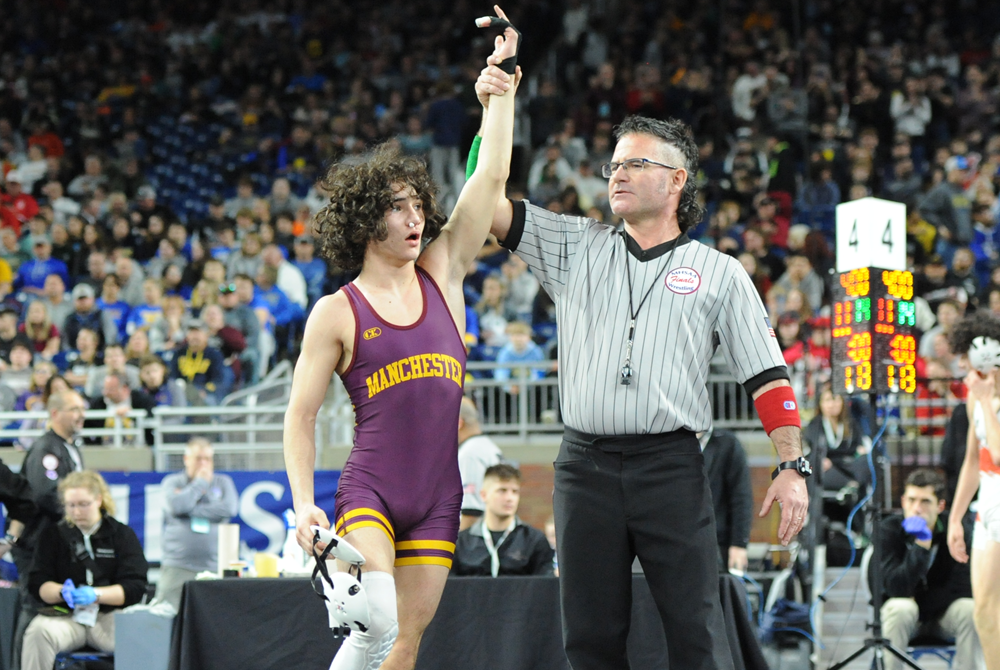
'Hearts' Focus Includes Action Planning
November 12, 2015
By Geoff Kimmerly
Second Half editor
As most of Michigan’s high school athletes move inside this month for the start of winter sports, many will take part in a program introduced to Michigan High School Athletic Association member schools this fall that assists coaches and students in preparing for the possibility of a health emergency during their after-school practices and events.
Prior to the start of this 2015-16 school year, the MHSAA sent every member school the “Anyone Can Save a Life” emergency action plan authored by the Minnesota State High School League and the Medtronic Foundation. The program instructs schools to assemble teams made up of coaches and their students that will act in the event someone suffers sudden cardiac arrest or another emergency medical situation.
“Anyone Can Save a Life” suggests a game plan that establishes four teams on every level of every sport in a school – a 911 Team, CPR (cardiopulmonary resuscitation) Team, AED (automated external defibrillator) Team and Heat Stroke Team. The groups are made up of coaches and their students who will be in close proximity to all after-school activities.
It’s another valuable tool as the MHSAA begins work on the fourth piece of its eight-year “4 H’s” health and safety emphasis. The next two school years focus on Hearts to go with efforts over the last six years centered on Health Histories, Heads and Heat issues faced by MHSAA athletes. This fall, for the first time, all varsity head coaches at MHSAA member schools were required to have CPR certification – another means by which athletic personnel can work to counter the random, unpredictable nature of sudden cardiac arrest.
“There is something we can do. We can be prepared. We can develop emergency plans, display AEDs and deliver CPR. And, like any good sports teams, we need to practice our preparations,” MHSAA Executive Director John E. “Jack” Roberts said. “’Anyone Can Save a Life’ can help schools revise or revitalize their existing emergency plans in ways that engage team members in planning, practice and execution. This could help save lives now and also convey important lifelong life-saving lessons to students involved on these teams.”
Students are a vital component to having a successful emergency action plan. They will be put in position to call 911, meet the ambulance at a pre-determined access point, locate the nearest AED, make sure immersion tubs are filled for hot-weather practices, and for those who are trained, to assist with CPR. Coaches identify students at the beginning of the season and prior to an emergency taking place, and provide them with the details of the job they are assigned so they will be ready to assist in the event of an emergency.
The “Anyone Can Save a Life” plan was sent to schools nationwide with assistance from the National Federation of State High School Associations and the NFHS Foundation. Click for information on "Anyone Can Save a Life."
“The ‘Anyone Can Save a Life’ initiative promotes the need to have and to practice planning for different kinds of emergencies,” Roberts said. “The result can be a fresh, comprehensive emphasis on preparing for emergencies well before they occur and then responding with more confidence when those emergencies inevitably happen. It is the perfect link between the last two years when we focused on heat illness and the next two years when we focus on sudden cardiac arrest.”
This fall’s focus on “Hearts” began in the wake of 122 Michigan schools receiving recognition this spring as HEARTSafe by the Michigan Department of Health and Human Services, Michigan Department of Education, American Heart Association, Michigan Alliance for Prevention of Sudden Cardiac Death of the Young and the MHSAA.
Public Act 12 of 2014 requires all schools (grades kindergarten to 12) to have a cardiac emergency response plan in place. This MI HEARTSafe School designation recognizes 122 schools that have taken steps above and beyond to prepare to respond in the event of a cardiac emergency, and is awarded for a period of three years.
In order for a school to receive MI HEARTSafe designation, it must perform at least one cardiac emergency response drill per year, have a written medical emergency response plan and team, have current CPR/AED certification of at least 10 percent of staff, have accessible, properly maintained and inspected AEDs with signs identifying their location, and ensure pre-participation sports screening of all student-athletes using the current physical and history form endorsed by the MHSAA.
Schools that meet all requirements are able to apply for the MI HEARTSafe School designation each year. Click for information and for a list of designated schools.

Longtime Coach Vlcek has Manchester On Pace to Contend in D4 Title Race
By
Doug Donnelly
Special for MHSAA.com
December 19, 2023
Steve Vlcek is 34 years into his varsity coaching career at Manchester and might have his best team yet.
 The season still has a long way to go, of course, but Vlcek is confident that what is being built right now in the Flying Dutchmen wrestling room is something special.
The season still has a long way to go, of course, but Vlcek is confident that what is being built right now in the Flying Dutchmen wrestling room is something special.
“I always call this our preseason,” he said. “We’ll have four tournaments before the new year. That’s 26 or 27 matches per kid. That way, we can figure out where we are at, what we need to work on more. Then we can start tweaking stuff a little bit.
“It’s been a really great start. I see a lot of improvement in our team.”
Vlcek, who has won more than 700 meets in his career, and Manchester have been on the cusp before. The Flying Dutchmen have won 18 straight District championships and own a dozen Regional titles. Manchester was the Division 4 runner-up in 2008 and has reached the Semifinals multiple times.
The last two years, they’ve qualified for MHSAA Team Finals weekend but have lost the first day in Quarterfinals.
“It’s been a little frustrating, but you have to keep plugging away,” Vlcek said. “We’re trying. We have a good shot the next couple of years.”
Vlcek was a football guy at Manchester, but when the school didn’t field football in 1981, he turned to wrestling.
“We didn’t have football my freshman year, and I was driving my mom crazy,” Vlcek said. “I took up wrestling.”
During his four years with the varsity, Manchester went through three coaches. It was his final coach, Dan Jordan, who invited Vleck back a couple of years later to work with some of the wrestlers on the team.
 “He called me up and asked if in my free time I would come and work with a couple kids,” Vlcek said. “Two years later, I was the junior high coach, and two years after that he resigned, recommended me for the job and I got it. He did a really good job of bringing up the program.”
“He called me up and asked if in my free time I would come and work with a couple kids,” Vlcek said. “Two years later, I was the junior high coach, and two years after that he resigned, recommended me for the job and I got it. He did a really good job of bringing up the program.”
Vleck never thought he would be a coach, but it became his passion.
“Once I started working with the kids, I really enjoyed it,” he said. “I wasn’t sure how much I would like it as a 19-year-old, or 20-year-old kid, but I did.”
Some of his early Manchester teams struggled with numbers. They’d often have seven or eight wrestlers win matches but lose in a dual-meet format because of the forfeits. That started to change during the mid-2000s.
“We started getting good classes together, and that made a considerable difference,” he said.
He picked things up from rival coaches, some of whom he has become friends with over the years.
“You pick up little things from each coach you coach against,” he said.
He credits a strong youth program at Manchester with developing wrestlers at a young age.
“We have a very involved youth program,” he said. “They’ve brought a good product to me. I try to stay away from it, let them develop it. We are very lucky to have it.”
He also credits a slew of assistant coaches, such as Mike Bunn.
“I can name 20 guys who have come into the room and make the program better every day,” he said. “I have my son (Brock) coaching with me now, and I really enjoy that.”
 The Flying Dutchmen have 10 juniors on this year’s squad, including Sammy Stewart, who won an Individual Finals title last year at 113 pounds, and Blake Sloan, who was runner-up at 138.
The Flying Dutchmen have 10 juniors on this year’s squad, including Sammy Stewart, who won an Individual Finals title last year at 113 pounds, and Blake Sloan, who was runner-up at 138.
Stewart missed a good part of the 2022 season while recovering from a hand injury.
“He had a really bad accident in shop class,” Vlcek said. “He almost cut his hand off. He came back in mid-January. He definitely had to overcome some obstacles. He avenged the loss he had (during the regular season) in the state finals.”
Sloan is another of the super sophomores. He’s coming off a record-setting football season in which he rushed for more than 2,100 yards.
“I can’t ask more out of those guys,” Vlcek said. “They put their time in and help their teammates out. We have seven or eight kids who have been state qualifiers. We still have some work to do, but there is improvement.”
Manchester is 10-2 in dual meets to start this season, giving Vlcek 711 career victories. The Flying Dutchmen have played a good schedule and have been ranked anywhere from No. 2 to No. 5 in early-season team rankings.
“I like to be challenged,” Vlcek said. “You don’t get better without wrestling the best.”
 Doug Donnelly has served as a sports and news reporter and city editor over 25 years, writing for the Daily Chief-Union in Upper Sandusky, Ohio from 1992-1995, the Monroe Evening News from 1995-2012 and the Adrian Daily Telegram since 2013. He's also written a book on high school basketball in Monroe County and compiles record books for various schools in southeast Michigan. E-mail him at [email protected] with story ideas for Jackson, Washtenaw, Hillsdale, Lenawee and Monroe counties.
Doug Donnelly has served as a sports and news reporter and city editor over 25 years, writing for the Daily Chief-Union in Upper Sandusky, Ohio from 1992-1995, the Monroe Evening News from 1995-2012 and the Adrian Daily Telegram since 2013. He's also written a book on high school basketball in Monroe County and compiles record books for various schools in southeast Michigan. E-mail him at [email protected] with story ideas for Jackson, Washtenaw, Hillsdale, Lenawee and Monroe counties.
PHOTOS (Top) Sammy Stewart’s hand is raised by the official in victory after the Manchester standout won his championship match at the Individual Finals in March. (Middle) Teammate Blake Sloan, right, considers his next move during his championship match last season. (Below) Coach Steve Vlcek embraces Stewart after the victory. (Click for more from High School Sports Scene.)

